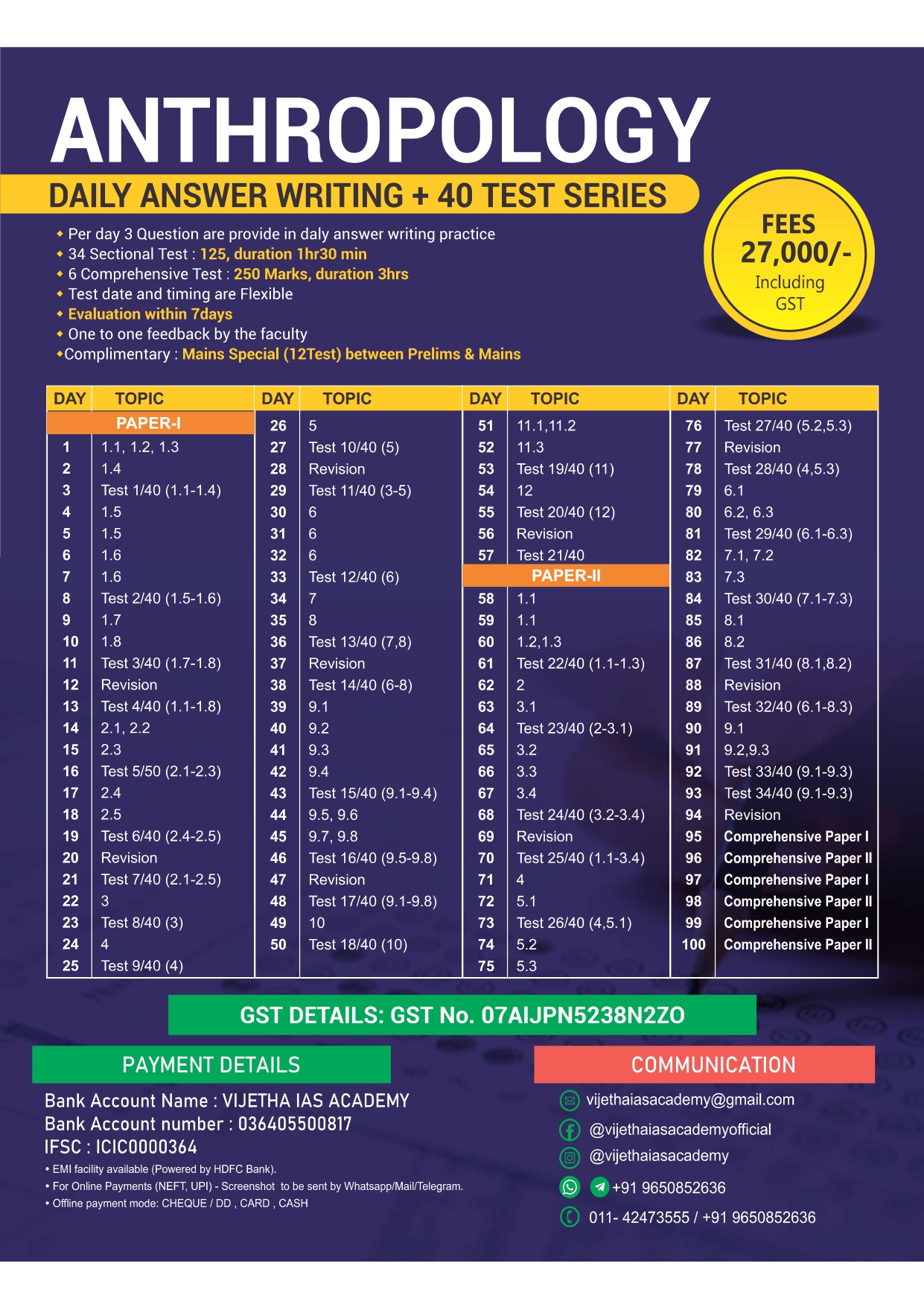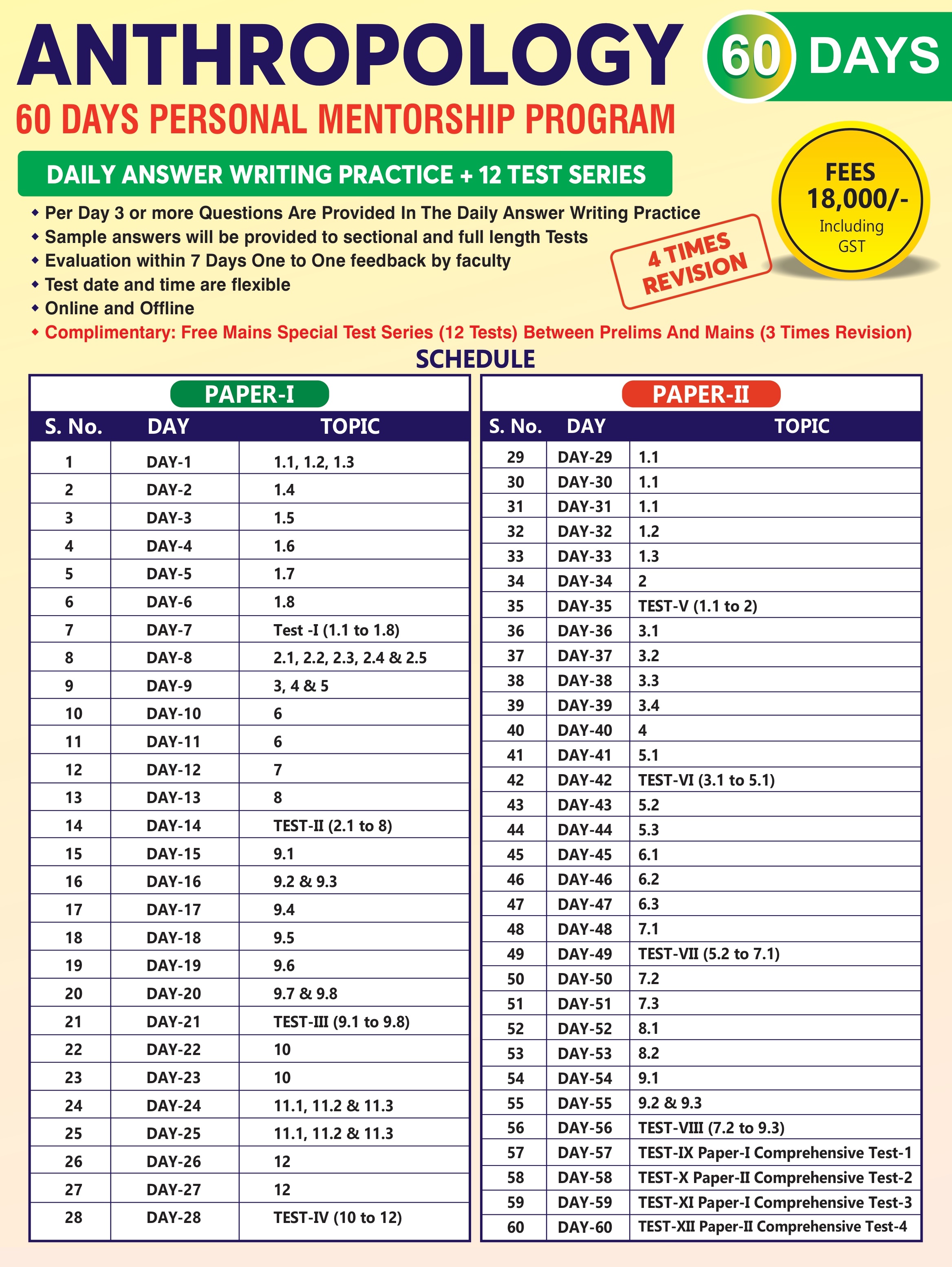
Define urbanization and discuss its impact on family in India with examples.
(15 Marks) Anthropology Optional Paper CSE 2024
Introduction
Urbanization refers to the process by which large numbers of people migrate from rural to urban areas, leading to the expansion of cities and towns. This transformation is characterized by changes in lifestyle, employment patterns, infrastructure, and social organization. In India, rapid urbanization has been a significant socio-economic phenomenon, particularly since the mid-20th century, and it has had profound impacts on family structures and dynamics.
Main Body
Urbanization in India:
India's urbanization has been driven by industrialization, economic development, and the pursuit of better employment, education, and healthcare opportunities. The urban population in India has steadily increased, and as of the 2011 Census, about 31% of the population resided in urban areas, a figure expected to rise in subsequent decades.
This urban shift is accompanied by the growth of megacities, such as Mumbai, Delhi, and Bangalore, as well as the rise of smaller urban centers.
Impact of Urbanization on the Indian Family: Urbanization has had a transformative effect on the family structure in India, which has traditionally been characterized by joint families. The shift to urban living has led to both positive and negative consequences on familial bonds and roles.
Nuclearization of Families:
One of the most prominent impacts of urbanization is the increasing trend of nuclear families replacing joint families. Economic pressures, the demand for housing, and job mobility often lead individuals to establish smaller family units, consisting of parents and their children. For example, in metropolitan cities like Mumbai, housing constraints and the need for mobility have accelerated this trend.
In contrast to the traditional joint family system, where multiple generations lived together, urban families are often isolated from extended kin, leading to changes in family responsibilities and caregiving.
Changing Gender Roles:
Urbanization has led to the increasing participation of women in the workforce, which has brought about a shift in traditional gender roles. Women in urban areas often balance professional responsibilities with domestic duties. This shift is reshaping family dynamics, as seen in cities like Delhi and Bangalore, where women’s employment contributes to the household income but also alters traditional expectations of caregiving and household work.
However, this change is also associated with challenges, including work-life balance pressures and a redefinition of gender expectations within the family.
Intergenerational Relationships:
The move toward nuclear families has affected intergenerational relationships. In joint families, the elderly were traditionally cared for by the younger generations. Urbanization, however, often results in physical separation from older family members, leading to the rise of old-age homes or independent living arrangements for seniors. This is particularly evident in cities like Chennai and Pune, where old-age homes have become more common due to the breakdown of joint families.
This can result in a loss of intergenerational communication, with elders feeling isolated and younger generations missing out on shared cultural and familial values.
Marriage and Kinship Patterns:
Urbanization has also influenced marriage practices. Traditional arranged marriages, which were more prevalent in rural areas and joint families, are increasingly giving way to love marriages or marriages based on personal choice in urban areas. Additionally, urbanization has led to a delay in the age of marriage due to the prioritization of education and career.
Children and Education:
Urbanization has improved access to education and healthcare, which has positively impacted children’s development. However, urban living can also result in reduced family time, as both parents are often working, leading to a greater reliance on external caregivers or daycare centers. For instance, in cities like Gurgaon and Bangalore, dual-income families often depend on domestic help or daycare services for childcare, which contrasts with the traditional family-oriented child-rearing practices of rural areas.
Examples of Urbanization Impact on Families in India:
Mumbai: Housing shortages and high real estate prices have led many families to adopt a nuclear family structure, often living in small apartments. Extended family members are rarely part of the same household.
Bangalore: As an IT hub, the city has seen a significant rise in nuclear families where both spouses work in the technology sector, altering traditional roles and expectations.
Chennai: Old-age homes have increased in number as nuclear families become more common, leading to a shift in elder care responsibilities.
Delhi: There is a growing trend of young couples opting for love marriages or inter-caste marriages, driven by increased education and exposure to diverse social values in urban settings.
Conclusion
Urbanization in India has significantly impacted family structures and relationships. While it has led to modernization in gender roles, educational opportunities, and economic independence, it has also brought challenges such as the weakening of intergenerational ties, the rise of nuclear families, and shifts in caregiving roles. Understanding these changes is crucial for addressing the social and cultural shifts that accompany urbanization in Indian society.
Anthropology Test Series Programme (Online + Offline))
We provide Anthropology Daily Answer Writing a range of programs designed to cater to various stages of UPSC preparation. Whether you're just starting out, have attempted the Mains before, or are getting ready for Mains 2024, we have the right option for you. Allow us to assist you in choosing the course that best fits your needs.
|
Level of Preparation |
Test Series Program |
Test Series Content |
Test Schedule |
|
Self-study of Anthropology Optional |
Anthropology 100 Days Personal Mentorship Program |
Daily answer writing, 34 sectional tests, 6 comprehensive tests, and complementary Mains Special 12 tests (between prelims and mains) |
|
|
Revise whole syllabus through Daily Answer Writing Practice and Tests |
Anthropology DAW Mentorship Program |
Daily Answer Writing Practice and 8 sectional and 4 Full Length tests |
|
|
Revise whole syllabus through Sectional and Full Length Tests |
Anthropology Tier- I T-40 Test Series |
34 Sectionals and 6 Full Length Tests |
|
|
Written Mains earlier and need more practice |
16-Anthropology Tier II Test Series |
10 sectional and 6 Full-Length Tests. |
|
|
Cleared Prelims 2023 and are preparing for Mains 2023 |
Mains Special 12 Tests program |
8 Sectional and 4 Full-Length Tests |
ANTHROPOLOGY MAINS SPECIAL COURSES
Enroll in our Anthropology Mentorship Program today and take the first step towards achieving your UPSC goals!
1) If you are going for Self study of Anthropology Optional and looking for a Comprehensive Program that includes Daily Answer Writing, 34 Sectional tests, 6 Comprehensive tests, and Complementary mains special 12 tests (between prelims and mains), our Anthropology 100 Days Personal Mentorship Program is the perfect choice.
2) If you want to revise Whole Syllabus through Daily Answer Writing Practice and 8 sectional and 4 full length tests, then our Anthropology DAW Mentorship Program is the best fit for you.
3) If you want to revise Whole Syllabus through 34 Sectionals and 6 Full Length Tests then Anthropology Tier- I T-40 Test Series is for you.
4) If you have written Mains earlier and need more practice, then our 16-Anthropology Tier II Test Series is a great option. This test series includes 10 sectional and 6 full-length tests.
5) if you have cleared Prelims 2023 and are preparing for Mains 2023,our Mains Special 12 Tests program is a must-have. This program includes 8 sectional and 4 full-length tests to help you prepare for the big day.
For more information on Vijetha IAS Academy’s Anthropology mentorship programs Deatils : https://vijethaiasacademy.com/anthropology-test-series
Anthropology 100 Days Personal Mentorship Program ( 7 + 3 Times Revision )

Anthropology 60 Days Personal Mentorship Program ( 4 + 3 Times Revision )

For more information: https://vijethaiasacademy.com/anthropology-test-series
Details Of Anthropology Classes Program
Top Anthropology Optional IAS Coaching Center in Delhi Vijetha IAS Academy | Best Anthropology Optional IAS Coaching in Delhi
Fee Structure:
- Tier 1: Rs. 55,150/- (3 Years Validity of Offline/Live Batch)
- Tier 2: Rs. 42,000/-
- Tier 3: Rs. 36,000/-
Batch Size: 50 – 60 Students
UPSC Notes
Anthropology Optional IAS Coaching Notes, IAS Exam Preparation Booklets, IAS optional coaching Notes, UPSC Coaching Notes, Video Lectures, Live Classes with faculty, Chat Facility Available
Teachers Name: N P Kishore Sir
Past Result
- Last Years Result 2023
- 35 Total Selections in CSE 2023
Google Reviews: 4.9 out of 5 stars
Website: Vijetha Anthropology Optional IAS Coaching in Delhi (https://vijethaiasacademy.com)
Faculties of Vijetha IAS Academy
- N P Kishore Sir
Features
- Vijetha IAS Academy offers Online and offline Courses for better preparation of Anthropology Optional Strategy for UPSC in Delhi.
- For better Anthropology optional Exam Preparation, Vijetha IAS Academy Delhi Conducts the Motivational IAS Session.
- Vijetha IAS Academy provides you with the CASE STUDIES on the pattern of the real-time IAS Exam which is helpful for better preparation of the Best Coaching for UPSC Anthropology Optional Optional IAS Examination.
- DAW & WAW – Revision Through Daily & Weekly Answer Writing Practice is offered by Vijetha IAS Academy for better result of the Anthropology Optional IAS examination.
Advantages of joining Vijetha IAS Academy
- Best Faculties for Anthropology Optional IAS Coaching in Delhi
- Best facilities, infrastructure and updated Case Studies Booklets and Notes for better preparation of the Anthropology Optional IAS Examination in Delhi.
- Best result in Past years for Anthropology Optional Strategy for UPSC Examination in Delhi
- Best Rated coaching institute for Anthropology Optional IAS Examination in Delhi.
- Vijetha IAS Academy also provides recorded lectures videos, notes which is very helpful for better preparation of Anthropology Optional IAS Coaching in Delhi
Fees Structure of Vijetha IAS Academy
|
Tier 2 |
Tier 1 |
Tier 3 |
BATCH STARTS FROM |
|
42,000/- |
55,150/- (3 Years Validity Offline/Live Batch) |
36,000/- |
REGISTRATION – START |
Fees Structure of Vijetha IAS Academy
|
Course Name |
Fees Amount |
Course Duration |
|
GS Offline (Pre + Mains+ CSAT) with Essay+Answer Writing |
Rs.99,000 (Including GST) |
400+ Days |
|
GS Online |
Rs.18,999 (Including GST) |
400+ Days |
|
GS Mentorship Programme |
Rs.29,999 (Including GST) |
1 Year |
For more information on our courses, visit our Anthropology Courses page. Explore our Test Series and Online Courses for flexible learning options.
Vijetha IAS Academy
Add. 2nd Floor, 50, Shankar Road, Block 7, Old Rajinder Nagar, Rajinder Nagar, New Delhi, Delhi 110060
MOB. 096508 52636
Open 7 Am : Closes 9 PM
Keywords: anthropology 2024 question paper, Anthropology optional subject question paper 2024, Anthropology optionals 2024 question paper, Anthropology Optional Coaching UPSC, Vijetha IAS Academy Anthropology, Anthropology crash course UPSC, Anthropology daily answer writing UPSC, Kishore sir Anthropology, Harappan maritime trade, Indus Valley trade networks, ancient economic systems.
